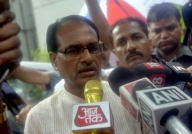 The Shivraj Singh Chouhan-led Madhya Pradesh government has finally decided to digitise the operations of the scam-tainted Vyapam. The move comes a full six years after it was first decided to make the exams for recruitment and admission to professional colleges in the stae more accountable by putting the process online.
The Shivraj Singh Chouhan-led Madhya Pradesh government has finally decided to digitise the operations of the scam-tainted Vyapam. The move comes a full six years after it was first decided to make the exams for recruitment and admission to professional colleges in the stae more accountable by putting the process online.
In fact, in 2011, the state government and Vyapam decided to rope in MP Online – a self-financed, state-run body in joint venture with Tata Consultancy Services – to digitise the system used to not just recruit professionals, but also conduct exams for admission to professional courses.
IANS has seen a letter (dated November 18, 2011) written by the then chairman of Vyapam, Ranjana Chaudhary, to the principal secretary to the chief minister, Dipak Khandekar, discussing the modalities of the process and the due diligence followed to reach the decision to hire MP Online.
The letter also goes on to mention that Madhya Pradesh Professional Examination Board (Vyapam) was ready to conduct a pilot online exam for the Pre-MCA test in 2012.
Curiously, the entire process seems to have stalled thereafter and Vyapam continued operating in the offline mode.
“During our telephonic discussion on November 9, 2011, you had informed me that MP Online is a self-financed state government-run agency and is registered under the Company Act. There is also a joint venture between MP Online and TCS for technical assistance. Therefore, since both the Mandal (examination board or Vyapam) and MP Online are self-financed state-run bodies, a tie-up between the two is workable and there is no need to invite bids,” the letter stated.
The letter also stated: “Currently, there is already an agreement between MP Online and the Mandal to invite online applications. To organise online examinations, 40 different parametres are required to be studied. Only after studying all the parametres the examination fee will be decided. Besides it was also decided that the Mandal will use MP Online software to prepare question banks.”
According to Chaudhary’s letter, in its presentation, TCS showed it had examination centres that could seat 35,000 candidates for an online examination. Engineering and government colleges, where computer facilities were available, were deemed fit to be examination centres, the letter went on to mention.
After online examinations, MP Online was required to provide soft copies of the answersheets to Vyapam in an encrypted form. “A pre-MCA examination, in which very few students would be involved, will be conducted online to start the process,” Chaudhary informed the CM’s office.
The letter also mentioned that the proposal to conduct recruitment examinations online in Madhya Pradesh was taken in 2009. Proposals were invited from three national companies and seven state-level bodies. However, most are mentioned as not having responded positively or adequately to Vyapam’s query.
When contacted, Vyapam chairman M.M. Upadhyay told that he was not aware of the developments since 2009. “I am not aware of what happened in 2009. We will hold the first online exam on August 30 – Pre-Ayurvedic, Homoeopathy and Unani Test.
Vyapam conducts examinations to recruit Class III and IV employees in the state and admission tests for medical courses.
Chaudhary also mentioned in the letter that though MP Electronic Development Company Ltd. gave its consent to conduct examinations online in 2009, the corporation did not suggest any concrete step.
“Had the state government started online examinations then, it could have prevented impersonation, question paper leakage and tampering with the answersheets. But the government never had the intention of doing it. They were hand-in-glove with influential people to stall the process,” said Ajay Dube, one of the whistle-blowers of the Vyapam scam.
According to reports, the admission and recruitment scam involving politicians, senior officials and businessmen in Madhya Pradesh could be pegged at Rs.20,000 crore involving around 30,000 people.
More than 40 people associated with the Vyapam scam have died since 2013, either under mysterious circumstances or committed suicide. (IANS)
